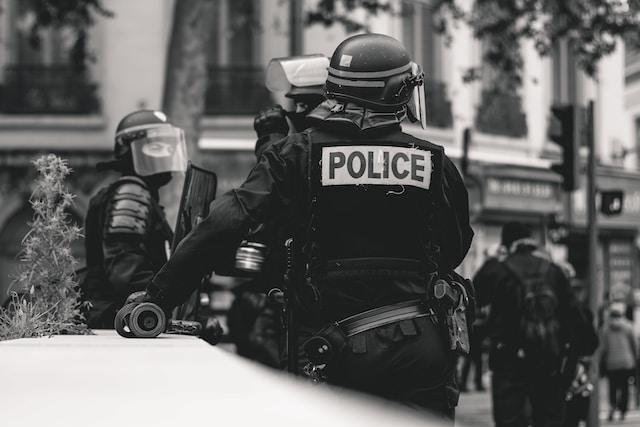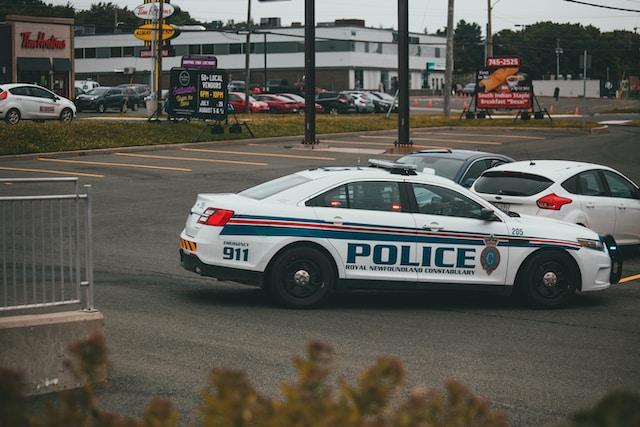How To Sue A Police Department
Our product recommendations are made independently, but we may earn affiliate commissions if you use a link on this page.
Whether you’ve been wronged by a department or know someone who has had issues with a police unit, it’s good to know your rights when taking legal action against a police department. Is it possible to sue an entire department, or can you only limit it to one officer?
Although you can sue a department, it’s a very tricky process and likely will not go well for you, thanks to the legal immunity of many officers. However, if you believe you have the evidence to back it up, it’s possible to file multiple misconduct claims at once.
If you’re curious to learn more about your legal rights after you’ve been wronged by a police department, read on. As a citizen of the United States, you need to know your abilities if you are ever in this horrific situation.
How To Sue A Police Department
Suing the police department sounds straightforward, but it’s more complicated than that. There are many different things you can sue the police for, and each of them requires a different process and forms of evidence. It’s helpful to know each option to determine which violation best fits before proceeding.
Let’s talk about a few of the most common reasons to sue the police department and how you can act against the authorities if you have been wronged by them. Whether you feel your civil rights have been broken or are experiencing emotional distress from police interaction, there are many things you can do to earn compensation for your suffering.

Suing For Violating Civil Rights
Civil rights cases are a common reason victims sue police officers and police departments. Examples of civil rights violations include wrongful search and seizure, unlawful arrests, wrongful conviction, and excessive force. Any case in which police are violent or take action based on race or other factors violates civil rights.
To sue the police for violating your civil rights, you should complete the following actions:
- Determine the damages you have suffered for the violation
- Specify the police you want to sue or whether you want to act against the entire department
- Ensure you have enough evidence of the situation to prove your case
- Contact a lawyer to help you through the legal process
From there, you and your law professional can proceed with the case.
It’s not okay for the authorities to treat you differently on a legal level based on race, sexuality, gender, or more. They do not have the right to treat you differently unless you are a dangerous criminal acting violently against them. If you feel they have violated your civil rights, it’s possible to sue them for the distress.
Suing For Emotional Distress
Another common reason individuals sue the police department is due to emotional distress. This police might cause emotional harm to an individual by acting intentionally or recklessly or performing a negligent act that causes emotional trouble to the individual. Either way, the affected person can sue for what they have experienced.
You can sue the police for emotional distress by doing the following:
-
Determine if you have a case for emotional distress, which occurs if you experienced:
- Extreme and outrageous conduct demonstrated beyond what is tolerable
- An intentional or reckless act, such as if they intentionally intended to cause emotional harm
- Physical injury, which could relate to the emotional injury experience
-
Decide who or what you want to sue, whether an individual officer or the police department
-
Gather a lawyer and other help to guide you through the case
From here, you can proceed and get what you are owed for the damage.
Emotional distress can be tricky because it’s much harder to prove than a physical injury or something recorded on a camera. However, it’s critical you fight if you experience emotional trauma at the hands of a police officer. They do not have the right to traumatize you, but you have the right to sue them if you are in the right.
Suing For Misconduct
Another common reason people sue police officers is for misconduct. Misconduct can include police shootings, police brutality, cruel and unusual punishment, failure to obtain medical care, no-knock warrants, and more. These are cases where the police acted out of their authority and reached beyond the law.
If you want to sue for police misconduct, you should do the following:
- Gather evidence of the misconduct, as much as you can
- Determine who or what you want to sue
- Get a legal authority to help you such as a lawyer
You can then move forward to take down the authorities that hurt you.
Misconduct is all too common today, so it’s critical to know you are allowed to act if you experience any of the examples above or something similar. Misconduct should be acted against to ensure police departments are at the top of their game and that they remove officers that should not be on their team.
Other Reasons To Sue
These are three of the most common reasons individuals sue police departments. However, there are a multitude of reasons besides these. Let’s go over more moments people typically choose to sue a police department, from simple money issues to violent actions against you, your loved ones, and your property.
Here are a few additional reasons people might sue a police department, other than the three reasons listed previously:
- Perjury
- Police brutality
- False arrest
- Actions of corruption
- Racial profiling
- Fraud
- Coercion
- Falsification of evidence
These are all valid reasons to sue the police, whether they are violent or not.
If you have been treated violently in an arrest, arrested without a good reason, or notice fraud and other illegal actions within a department, you have the right to sue them. All you need to do is ensure you have enough evidence to push your case forward, as police officers sit in powerful positions in our world. Some are there for good, while others want power.

Should You Sue The Police Department?
You can sue the police department, but that leaves a bigger question - should you sue the police department? It’s well-known that there is power in numbers, and an entire department may have more evidence than you to support its claim. It’s critical to carefully consider your options before deciding to sue the police department.
Typically, a violation of rights is taken very seriously by the accused police department. They will have a team of attorneys ready and waiting to act on their behalf, working to solve the situation without taking down the police department. They may or may not have your best interests in the legal process.
Speak with an attorney as soon as possible to determine if you have a case so you can take action before time runs out. If you let the trouble sit for too long, there’s a chance you won’t be able to sue the department or a group of police officers, even if you have valid evidence against them. Move fast for the best results on the legal floor.
Can You Sue An Individual Police Officer?
If you feel you’ve been wronged by a single police officer instead of an entire department, it’s possible to sue that one person instead of the group. Under federal law, you can sue an individual police officer personally or professionally in a state or federal court. However, there are some things to consider beforehand.
Before you sue an individual police officer, you should:
-
Ensure you have a valid case with plenty of evidence, or it will be thrown out
-
Check to see what immunities the police officer has
-
Consider common reasons for suing the police
- Excessive force
- Emotional distress
There should be plenty of resources in your state to reveal what you can sue an officer for and what protections they have against your lawsuit.
Your best action is to talk to an attorney as soon as possible to determine if you have a case before digging deeper into the court of law. If you do, they will help you push your information forward to get the compensation you deserve for your experience with the authorities
Does The Police Department Hold Sovereign Immunity?
Police officers and other public servants hold various forms of immunity designed to protect them from people who seek to harm them for no reason. Although these are beneficial for them, in some cases, they can cause serious harm to individuals who have been hurt by the police on an emotional or physical level.
The doctrine of qualified immunity is an action that defends state and local officers. This doctrine includes police officers from individual liability for an action unless the person accusing them of the crime clearly demonstrates they violated a constitutional right that has been clearly established in the legal system.
If you want to go out and sue a police department or individual police officer, ensure you have plenty of evidence before moving forward. If you’re not prepared, your case could be thrown out before you get the compensation you deserve.
What Is The Most Common Complaint Against Police?
The most common complaint against the police is the excessive use of force. Unfortunately, there are many cases where authority figures get drunk on their power and push more than they should when handling those under arrest or those they are speaking to in public or in holding. It’s a common issue and can quickly go too far and lead to serious harm.
A few other common complaints include issues such as the following:
- Unlawful arrest
- Assault
- Battery
Most people make complaints about the police for these actions.
Unfortunately, these reports have serious impacts on those affected. Excessive force, assault, and battery are all harmful to the body and mind. An unlawful arrest can be traumatizing and could change the course of a person’s life. These items should not be taken lightly, allowing bad officers to be pushed out of the department as soon as possible for safety purposes.
What Is The Most Serious Type Of Police Misconduct?
The most serious type of police misconduct, and the most commonly reported issue, is the use of excessive force. This term can be used as a general umbrella term for several issues within a police department. Excessive force can be a sign of aggression, racial profiling, or even assault and battery in some more extreme cases.
Anything in which a person is treated out of the ordinary during a legal incident is a problem. Police officers should only operate within their rights and act to pursue the law and keep citizens of an area safe. If they act with violence or arrest people based on profiling, issues are stirring within a police department.
Of course, every type of misconduct within a police department is a serious issue. Those who are in charge of keeping the law and defending citizens should not be corrupt or act violently in any way unless there is an absolute need for additional force in a situation for the protection of themselves or a civilian in the area.

What Are The Consequences Of Police Misconduct And Unethical Behavior?
It’s unfortunately very rare that a police officer pays for their actions unless the situation gains national attention or the victim has plenty of evidence to reveal what happened to them. However, if it’s clear the police officer is in the wrong, the department takes it very seriously. There are many repercussions for misconduct or unethical behavior.
If police are found guilty of misconduct or unethical behavior, there are a few things they could experience:
- Prison or jail time
- Fines
- Probation
- Removal from the police department
The consequences are serious if the police officer is found guilty of their crime.
Minor issues could lead to temporary probation time or a fine for the action, while more severe troubles could mean time in prison or jail and the removal of the officer from the police department. The result depends on the evidence and how far the police officer stepped out of line to do what they did to the victim.
What Is An Example Of Police Corruption?
Another item that you can sue against if you notice it within a department is police corruption. This issue is a little trickier to prove and harder to notice. However, there are a few things you can look for if you think a department has become corrupt. It’s best to catch this corruption before it goes too far and it’s too late.
Examples of police corruption include the following:
- Extortion, such as asking for money to not write a traffic ticket
- Bribery, such as taking money to not arrest someone or enforce other areas of the law
If money is involved, it’s usually a good sign there is police corruption.
Corruption can also occur if all the officers work together, taking the side of their fellow employees if they are in the wrong instead of standing up and doing what is right on behalf of the civilian victim. Corruption comes in all shapes and sizes, but it’s all terrible and does not belong in a police department.
What Are Signs Of Police Misconduct?
Misconduct is another form of corruption, but it tends to happen on the field and is much bolder than corruption. This issue is another reason an individual might want to sue a police department.
Signs of police misconduct include the following:
- Excessive use of force
- Coerced confessions
- Lying on police reports
- Tampering with evidence
- Sexual assault
These all point to police acting out of accordance with what they should be doing.
If you notice any of these items, you could be witnessing police misconduct in action. Speak to a law professional as soon as possible to determine your possibilities.
Who Investigates Police Misconduct?
Typically, the local police department investigates cases of misconduct within the system. However, there are instances when a higher system may need to step in to examine the officers involved and determine what needs to happen to move forward.
The internal affairs unit, an executive police officer, or an outside party can also investigate the misconduct. Typically, it’s a person in a higher position of power than the officer or officers involved.
What Is Police Abuse Of Power?
Abuse of power in a police officer occurs when this authority takes advantage of its ability to gain unlawful dominance over the people they have pledged to defend in the country. They typically complete this activity to fulfill their desires rather than look out for innocent people.
Police can abuse their power in many cases. They might make unlawful arrests, use excessive force on a person, or misuse their position to falsify evidence, among other items. They could lie about arrests or even turn off their body cameras during a violent situation.
Police abuse of power is serious. If you notice it, speak to a lawyer as soon as possible to narrow your options.
Reference Legal Explanations
If you use any of the definitions, information, or data presented on Legal Explanations, please copy the link or reference below to properly credit us as the reference source. Thank you!
-
<a href="https://legal-explanations.com/blog/how-to-sue-a-police-department/">How To Sue A Police Department</a>
-
"How To Sue A Police Department". Legal Explanations. Accessed on December 11, 2024. https://legal-explanations.com/blog/how-to-sue-a-police-department/.
-
"How To Sue A Police Department". Legal Explanations, https://legal-explanations.com/blog/how-to-sue-a-police-department/. Accessed 11 December, 2024
-
How To Sue A Police Department. Legal Explanations. Retrieved from https://legal-explanations.com/blog/how-to-sue-a-police-department/.